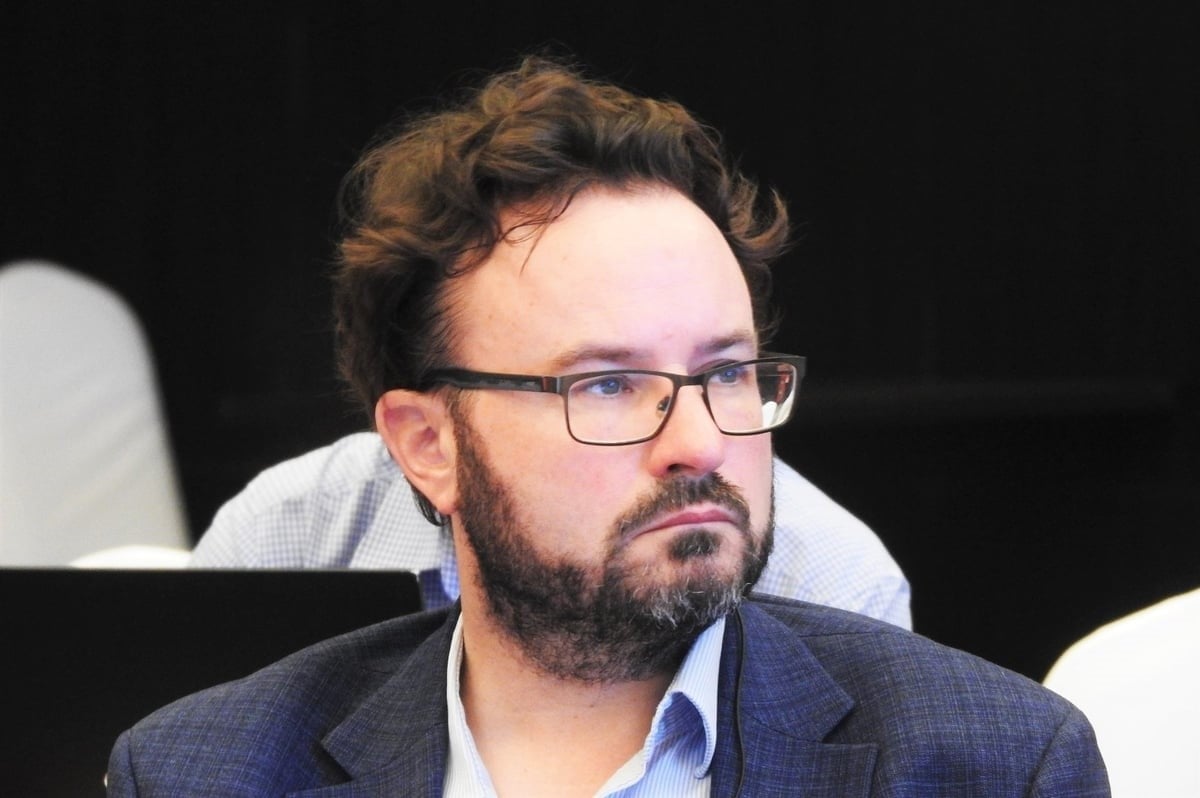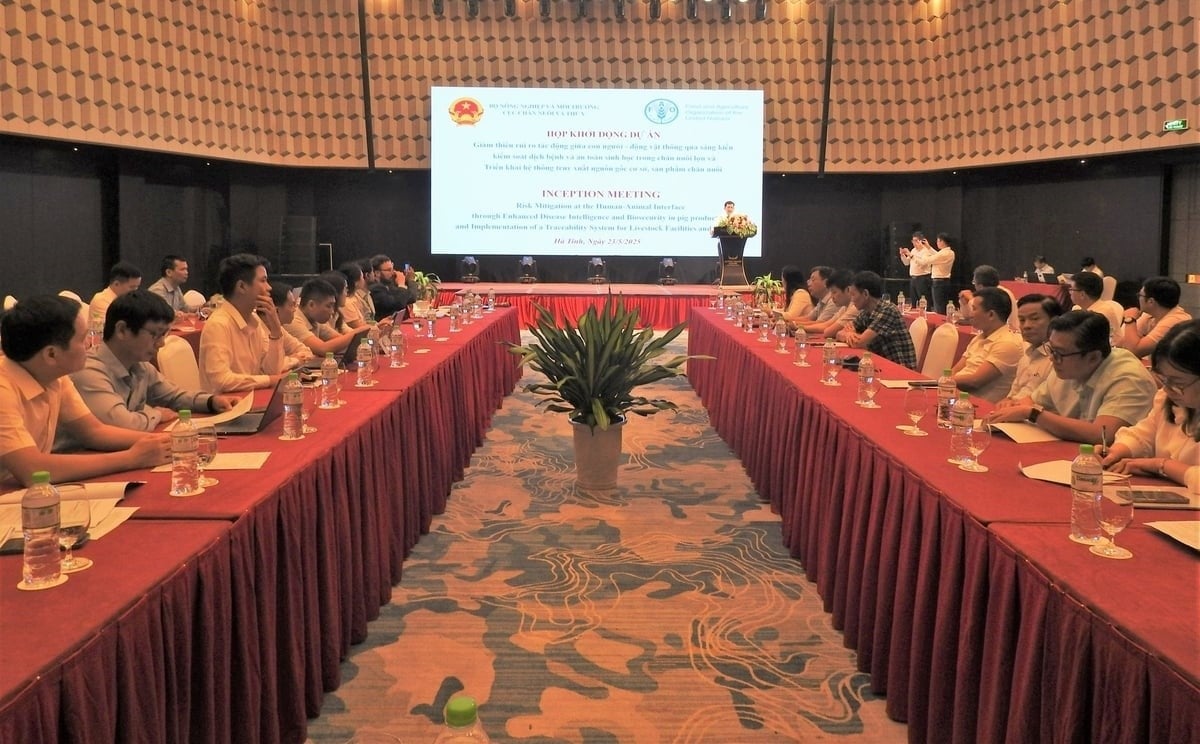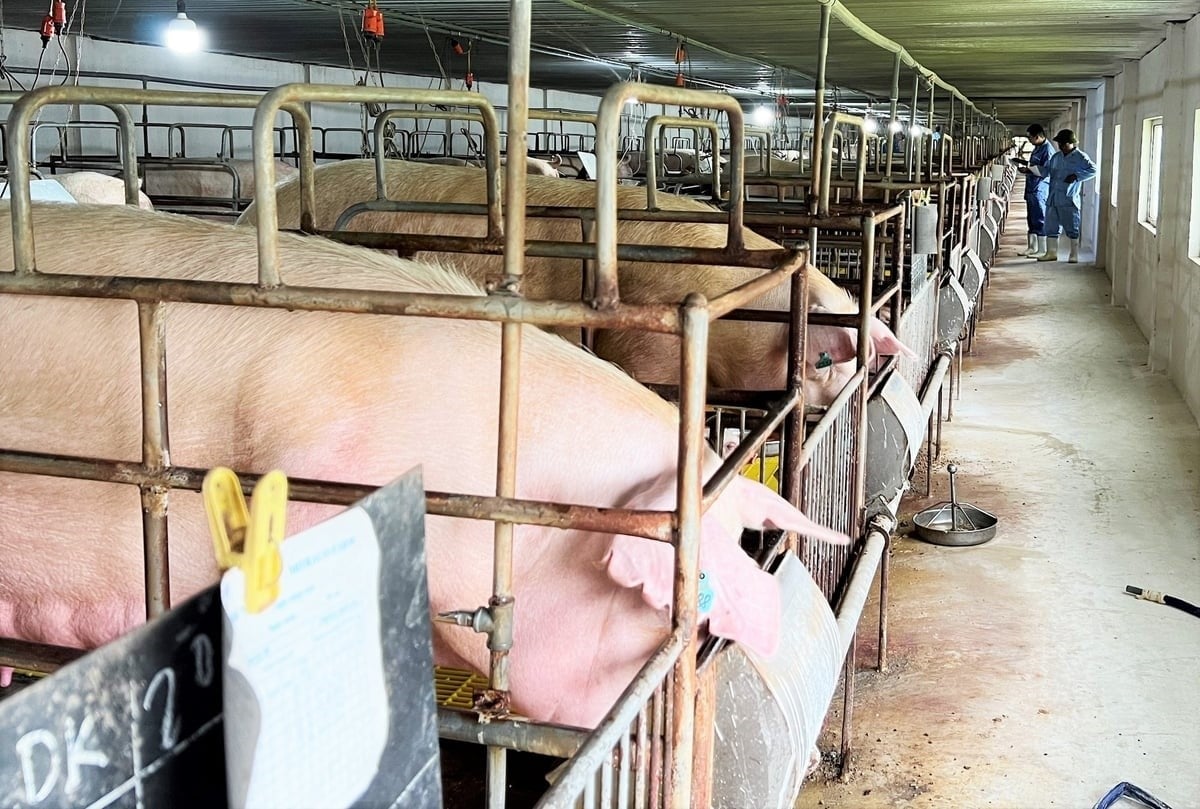May 25, 2025 | 16:40 GMT +7
May 25, 2025 | 16:40 GMT +7
Hotline: 0913.378.918
May 25, 2025 | 16:40 GMT +7
Hotline: 0913.378.918
On May 23, the launch ceremony of the project “Mitigating Human-Animal Interface Risks Through Disease Control and Biosecurity Initiatives in Pig Farming” and the implementation of a traceability system for livestock facilities and products was held in Ha Tinh province. Speaking at the ceremony, Mr. Duong Tat Thang, Director General of the Department of Livestock Production and Animal Health under the Ministry of Agriculture and Environment, said that pig farming has become a key industry, providing livelihoods for approximately 2.5 million farming households nationwide and ensuring meat supply for domestic consumption and export.

Mr. Duong Tat Thang, Director General of the Department of Livestock Production and Animal Health, affirmed that pig farming has become a key industry, making significant contributions to the overall development of the agricultural sector. Photo: Thanh Nga.
In addition, pork currently accounts for over 70% of total meat consumption in Vietnam, demonstrating the industry's irreplaceable role in people's daily lives.
“However, at present, dangerous infectious diseases circulating in pig herds, such as African swine fever and foot-and-mouth disease, not only directly affect production and cause economic losses for farmers but also threaten public health.
The implementation of the project, jointly carried out by the Food and Agriculture Organization of the United Nations (FAO) and the Department of Livestock Production and Animal Health, will help strengthen disease control capacities and promote the application of advanced biosecurity measures in pig farming, gradually reducing the risk of disease transmission from animals to humans,” Mr. Thang emphasized.

Mr. Nicholas Anthony Lyons, an expert at FAO, expressed his hope that FAO's support will help prevent and mitigate the risk of disease transmission from animals to humans. Photo: Thanh Nga.
Sharing the same view, Mr. Pawin Padungtod, Senior Coordinator at FAO Vietnam, stated that this is an innovative, practical, and urgent initiative. It aims to establish a modern and synchronous disease surveillance and prevention system, enabling early detection and effective control of disease threats, while enhancing the capacity to manage and operate livestock value chains under biosecurity standards.
Additionally, the project also supports the development of a traceability system for livestock facilities and products, which is an essential tool for quality management and information transparency. This tool will help build trust among domestic and international consumers and meet increasingly stringent requirements of the global market.
The establishment of a traceability system is not only a technical advancement but also a foundation for developing a sustainable livestock value chain, enhancing competitiveness, and promoting the growth of a modern, safe, and environmentally friendly livestock industry.
With total funding of USD 140,000, the project will be implemented in Ha Tinh and Ba Ria - Vung Tau provinces from 2025 to 2026.

An overview of the launch ceremony for the project “Mitigating Human-Animal Interface Risks Through Disease Control and Biosecurity Initiatives in Pig Farming” held in Ha Tinh. Photo: Thanh Nga.
As part of the project, small- and medium-scale pig farming facilities will receive both theoretical training and on-the-job training at the farm from experts, with direct interventions in farming processes, livestock care, and disease safety management in accordance with biosecurity standards.
Mr. Tran Hung, Director of the Ha Tinh Sub-Department of Crop Production, said that after conducting a review, the unit selected Mitraco Company's outsourced pig farming chain to pilot capacity-building activities for local households.
“Although farmers have significantly improved their awareness of disease prevention and control and have begun shifting toward more centralized and larger-scale pig farming, there remains a segment that lacks adequate and proper understanding of biosecurity farming processes. By identifying existing shortcomings and weaknesses in each farm, experts can help farmers improve their production conditions and reduce the risk of dangerous infectious diseases that have impacts on product quality and human health,” Mr. Hung emphasized.

The project is expected to help farmers improve production conditions through more controlled practices. Photo: Thanh Nga.
A representative from the Ba Ria - Vung Tau Department of Agriculture and Environment said that, in addition to support from FAO and Ministries, the province's corresponding policy attention in the animal husbandry and veterinary medicines field plays a crucial and indispensable role.
In recent years, Ba Ria - Vung Tau has introduced many effective support policies for livestock farmers. These include the Resolution of the Provincial People’s Council on support levels for the shutdown and relocation of livestock facilities located in non-permitted farming areas and another Resolution on support policies for vaccination against diseases in cattle and poultry.
Furthermore, the Provincial People’s Committee has also issued decisions on action plans to prevent and control dangerous infectious diseases such as African swine fever and foot-and-mouth disease, contributing to the expansion of the total pig herd to over 414,000 heads.
Translated by Thu Huyen

(VAN) The People's Committee of Tra Vinh province has approved an adjustment to the investment policy for the Green Hydrogen Plant project, increasing its area to approximately 52.76 hectares.
![Reducing emissions from rice fields: [2] Farmers’ commitment to the soil](https://t.ex-cdn.com/nongnghiepmoitruong.vn/608w/files/news/2025/05/05/dsc08881jpg-nongnghiep-140632.jpg)
(VAN) Clean rice cultivation model in Thuong Tan commune, Bac Tan Uyen district, is assisting local residents in achieving sustainable agriculture by substantially reducing costs, increasing productivity, and protecting the environment.

(VAN) At the conference to disseminate Resolution No. 68, AgriS introduced its digital agricultural ecosystem and reaffirmed its commitment to accompanying the Government in promoting private sector development and sustainable agriculture.

(VAN) 'Blue Ocean - Blue Foods' initiative is designed to restore marine ecosystems and establish sustainable livelihoods for local communities by cultivating a minimum of 1,000 hectares of cottonii seaweed in the first three years.
/2025/05/21/4642-3-112707_603.jpg)
(VAN) The V-SCOPE project has made direct contributions to three out of six pillars of the Comprehensive Strategic Partnership between Vietnam and Australia.

(VAN) Facing the threat of rabies spreading to the community, Gia Lai province urgently carries out measures to vaccinate dogs and cats on a large scale.